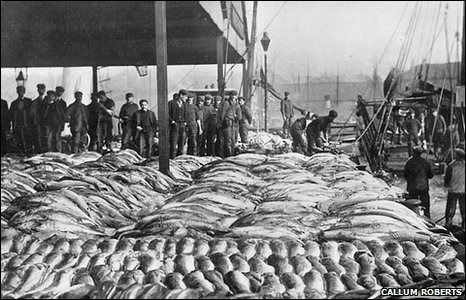‘Profound’ decline in fish stocks shown in UK records
By Richard Black, Environment correspondent, BBC News
Page last updated at 15:13 GMT, Tuesday, 4 May 2010 16:13 UK Over-fishing means UK trawlers have to work 17 times as hard for the same fish catch as 120 years ago, a study shows. Researchers used port records dating from the late 1800s, when mechanised boats were replacing sailing vessels. In the journal Nature Communications, they say this implies “an extraordinary decline” in fish stocks and “profound” ecosystem changes. Four times more fish were being landed in UK ports 100 years ago than today, and catches peaked in 1938. “Over a century of intensive trawl fishing has severely depleted UK seas of bottom living fish like halibut, turbot, haddock and plaice,” said Simon Brockington, head of conservation at the Marine Conservation Society and one of the study’s authors. “It is vital that governments recognise the changes that have taken place (and) set stock protection and recovery targets that are reflective of the historical productivity of the sea.” … As waters near the coast became depleted, industrialisation also meant the UK fleet could travel further in search of new grounds – a phenomenon that took off after 1918. But despite the growing power and range, the amount of fish caught for each unit of effort has gone drastically down, with 17 times more effort required now to catch the same amount of fish as compared with the late 1800s. …
‘Profound’ decline in fish stocks shown in UK records
